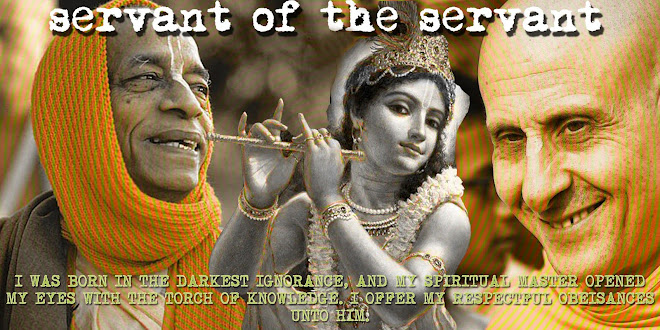A. The Vedas describe Reality at different levels. Not only in India, but invariably in every ancient culture in the world, there is description not only of "a" person, but an entire hierarchy of beings or "gods" assisting the Supreme Being as responsible agents for universal management. Such persons are technically called "isvaras" (controllers). Modern man has conveniently set them aside as mythologies with nothing more than his own speculation as the proof for such a claim. However, according to Katha
Upanisad there is a singular living entity who is the
source of all the other plural living entities, and who is identified elsewhere
by the term "bhagavan".
nityo nityanam cetanas cetananam
eko bahunam yo vidadhati kaman
tam atma-stham ye 'nupasyanti dhiras
tesam santim sasvatim netaresam
(Katha Upanisad 2.2.13 and Svetasvatara Upanisad 6.13)
One aspect of this supreme source is the brilliant
effulgence emanating from His form, known as Brahman. The non-material form of
the Supreme is not a later interpretation or invention. His spiritual form is
identified in all the Vedas as well as Upanishads.
"There is one eternal among the many eternals, one
conscious being among the many conscious beings; it is that One who satisfies
all the needs of the many."
isvarah paramah krsnah
sac-cid-ananda-vigrahah
anadir adir govindah
sarva-karana-karanam
"Krsna who is known as Govinda is the Supreme
Godhead. He has an eternal blissful spiritual body. He is the origin of all. He
has no other origin and He is the prime cause of all causes." (Sri Brahma
Samhita 5.1)
This conception of the Absolute Truth is explained thus:
vadanti tat tattva-vidas
tattvam yaj jnanam advayam
brahmeti paramatmeti
bhagavan iti sabdyate
"The Absolute Truth is realized in three phases of
understanding by the knower of the Absolute Truth, and all of them are
identical. Such phases of the Absolute Truth are expressed as Brahman,
Paramatma, and Bhagavan." (Srimad-Bhagavatam 1.2.11)
Your statement that Krishna or Rama are story-book
characters, or perhaps historical personalities is but an assumption, is it
not? Such a view, even if held by many, is not corroborated by any fact or
authority. Greatly revered and saintly authorities throughout the ages down to
the present day have accepted Lord Krishna, Rama and other avataras as
transcendental and worshipable.
Without keeping God in the center, it is not possible to
live a truly moral, ethical, "good" life. Please consider: Who is to
define what is good and honest life? Is this question not asked by moralists
and philosophers over the ages? [The standards for what is considered as
"leading a good life" being totally subjective when left without an
absolute point of reference can be appreciated by reflecting on the alarming
moral decrepitude of present society despite their clamor for universal peace
and goodwill.]
dharmam tu saksad bhagavat-pranitam
"Real religious principles are enacted by the
Supreme Personality of Godhead, Bhagavan." (Srimad-Bhagavatam 6.3.19)
Indeed, without accepting the authority of the common
father, there is no "universal brotherhood", or fraternity, no
unifying principle in a divergent people.
Answer by H.H.Romapada Swami

No comments:
Post a Comment